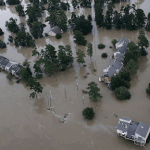Houston Neighbors Said No to Walmart...

Three months ago, Hurricane Harvey ripped through Houston and coastal Texas, killing 82 people, displacing more than 60,000, and leaving parts of Houston with severe wind and flood damage. As the city recovers from the strongest hurricane to hit in more than 50 years, many of its residents in historically Black neighborhoods continue to struggle for resources and support.
“Houston is the tale of two cities,” explains Andrew Cobb, cofounder of West Street Recovery, a nonprofit disaster response organization that formed out of Hurricane Harvey to aid residents in underserved neighborhoods.
“If you flew in from the airport and drove around, you’ll probably be like, ‘Well, I don’t see the problem,’” he says. “But upon investigation, you’ll see that a lot of people in Black and brown and low-income neighborhoods still need help. These people are living in homes with severe water damage, and they are breathing mold.”
Some homes were destroyed completely and many others need major and very expensive repairs. But as residents continue to wait for government assistance, they can’t afford to pay for the damages now and wait for FEMA to reimburse them later.
West Street Recovery has done as much of that physical work as possible. The nonprofit has mobilized 30 to 50 volunteers each weekend to clean residents’ homes on the north side. That has entailed cleaning furniture and breaking down walls to clear out mold. At one point they had a list of 150 homes that needed to be cleaned and tried to hit four or five houses every weekend. In addition to cleaning homes, West Street Recovery has provided these families with needed supplies and furniture, like mattresses and tents. They also have given residents rides to work, grocery stores, and appointments, and connected them to additional resources.
Cobb, a 31-year-old urban farmer who teaches classes on fermentation, didn’t intend to establish a full-fledged organization. After the hurricane passed and homes were flooded, he and his roommates just wanted to help people. Their first stop was in Kashmere Gardens, a predominantly Black neighborhood with a growing Hispanic population on the city’s east side. Kashmere Gardens was one of the first areas to flood during Hurricane Harvey.
Their efforts picked up traction on social media, which they used to mobilize about 100 volunteers who traveled via kayaks, canoes, bikes, and trucks to rescue individuals and families from their flooded homes in Houston’s Fifth Ward district. The volunteers shuttled people across flood waters to safer ground, and West Street members used their private rooms to shelter them.
On the south side of town, Alycia Miles, 32, was doing the same thing. She saw her neighbors who lived just blocks away pleading for help on Facebook. The first floors of their homes were flooding. To no avail, Miles tried to reach 911 and city and state officials. She asked on Facebook whether anybody had a boat and asked people to download Zello, a walkie-talkie app. On this app, Miles coordinated rescues: People gave their home addresses, and she directed volunteers to rescue them.
A mutual friend introduced Miles to Cobb, and Miles joined West Street Recovery. She is now in charge of coordinating the weekly cleanups.
“Why is it people in the Black neighborhoods or the brown neighborhoods or the poor neighborhoods who are still living in these homes?” Miles asks. “And a lot of these people were in need before the storm hit.”
When West Street Recovery generated enough money to start distributing food, it chose not to spend most of the money at big chains and corporations like Walmart. Instead, the organization sought out local Black- and brown-owned organizations and turned to Carmen Jules, the director of NuWaters Co-op, a Black-owned grocery store cooperative.
West Street Recovery opened a line of credit at NuWaters, and volunteers use the co-op’s facilities to prepare food for rescuers.
“I had already known Carmen and the work that they’re doing over there at NuWaters,” Cobb says. “We have gardeners and urban farmers on our team, so buying from NuWaters was really an alignment of our values to be purchasing straight from her.”
Jules says NuWaters Co-op, which opened in 2014 to address the food desert issue in the neighborhood, was one of the very few grocery stores that remained open during the hurricane. Her pickup truck was set far off the ground on big tires, so she was able to drive through high flood waters from her house to the co-op, which was unaffected by the hurricane.
While supplying West Street Recovery with produce, Jules and NuWaters distributed 1,000 sandwiches in the neighborhood and organized a two-day flood relief concert in October to raise money for 10 gap families, those who live paycheck to paycheck or are self-employed and don’t have the resources to cover the damages. Each week these families can walk into the NuWaters Co-op and get $40 toward groceries and $20 toward meat products. NuWaters hasn’t set a cutoff date for this initiative.
“We want to do this for as long as these people need it,” Jules says. “These families have missed a significant number of hours of work and are in financial difficulties.” She adds, “Making sure that these families are OK is the only thing we care about right now.”
Although West Street Recovery formed out of Hurricane Harvey, the organization doesn’t plan to dissolve once those in predominantly Black and brown neighborhoods recover. The members know that another hurricane will hit eventually, and they want to be prepared.
